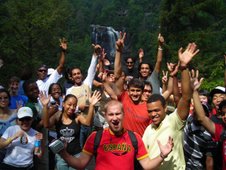Traveling Through the Dark
by William Stafford
Traveling through the dark I found a deer
dead on the edge of the Wilson River road.
It is usually best to roll them into the canyon:
that road is narrow; to swerve might make more dead.
By glow of the tail-light I stumbled back of the car
and stood by the heap, a doe, a recent killing;
she had stiffened already, almost cold.
I dragged her off; she was large in the belly.
My fingers touching her side brought me the reason–
her side was warm; her fawn lay there waiting,
alive, still, never to be born.
Beside that mountain road I hesitated.
The car aimed ahead its lowered parking lights;
under the hood purred the steady engine.
I stood in the glare of the warm exhaust turning red;
around our group I could hear the wilderness listen.
I thought hard for us all–my only swerving–,
then pushed her over the edge into the river.
QUESTIONS
What does the writer mean "to swerve might make more dead"?
What is a doe?
Why is the side of the deer still warm?
Why does the man hesitate?
Why does the man say his car "purred"? Is that at all symbolic or metaphoric?
What does he mean when he says, "I could hear the wilderness listen"?
What does he mean when he says, "I thought hard for all of us," just before he pushes the deer into the canyon?
Is there a link, a connection, between the fourth line where he writes, "to swerve might make more dead," and the second to last line where he writes, "–my only swerving–"?
Subscribe to:
Post Comments (Atom)

No comments:
Post a Comment